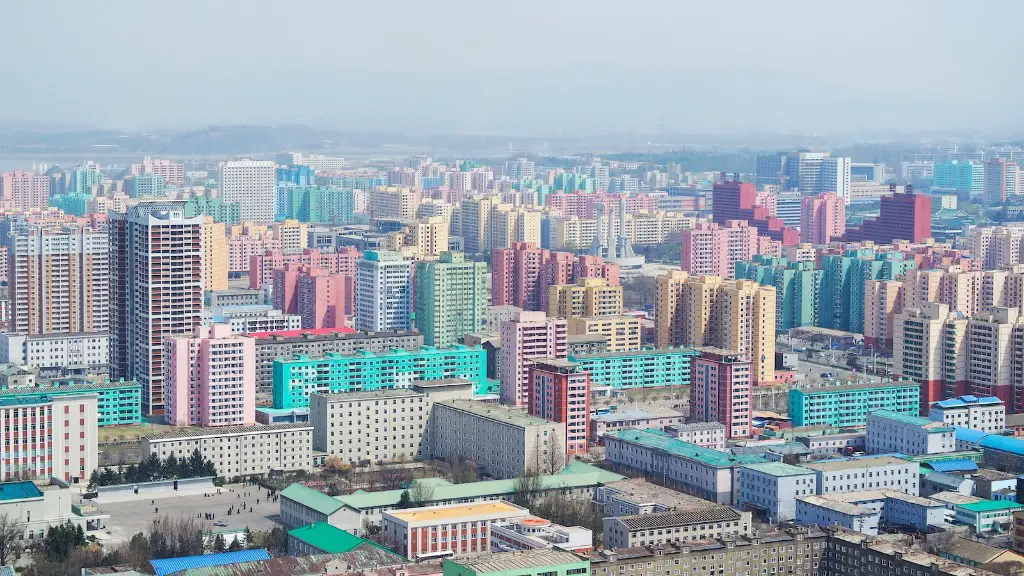Background Information
The threat of war between the United States and North Korea has been a long-standing one, with tension escalating between the two countries in recent years. North Korea has made numerous threats to carry out a missile strike on the U.S., and the regime has also increased its nuclear capabilities. In light of this, it is important to understand where North Korea would likely strike the U.S., and what kind of damage it could cause.
North Korea has made it clear that they have the capability to launch a missile strike on U.S. soil. This has heightened the risk of war, as any attack could potentially have devastating consequences. The U.S. is already familiar with North Korea’s missile capabilities, as the regime has tested multiple intercontinental ballistic missiles (ICBMs) in the past.
According to experts, the most likely targets of a North Korean missile strike would be the U.S. mainland, as well as Guam and Hawaii. Guam, a U.S. territory in the Pacific Ocean, is home to several U.S. military bases and is seen as a strategic target for North Korea. Hawaii also has several U.S. military bases, including the headquarters of the Pacific Command, making it a likely target.
In addition to the risk of a missile attack, North Korea could also use its nuclear weapons capabilities to strike the U.S., potentially leading to a nuclear conflict. North Korea has a stockpile of nuclear weapons, and the capability to deliver them to U.S. soil. This makes the threat of a nuclear attack extremely concerning.
Furthermore, North Korea has made it clear that they are prepared to use their weapons if necessary, which could lead to catastrophic consequences. North Korea has regularly threatened the U.S. with a “rain of fire and fury,” and the regime has also demonstrated a willingness to carry out attacks in other countries. All of these factors make the threat of a North Korean attack on the U.S. a serious one.
Economic Impact
A missile or nuclear attack from North Korea could cause serious economic damage to the U.S., as well as global markets. An attack on a major U.S. city or port could cause tremendous disruption in the global economy, and could also lead to a decline in international trade. This could lead to a recession, and could have long-term repercussions on the U.S. economy.
Furthermore, the U.S. would likely face major financial losses if North Korea were able to successfully launch a missile strike. The U.S. would have to bear the cost of rebuilding and repairing the damage caused by an attack, as well as the cost of providing assistance to those affected by the attack. This could lead to a major economic burden for the U.S. government and taxpayers.
In addition, it is likely that the U.S. could also face economic sanctions from other countries, as many nations are opposed to North Korea’s aggressive behavior. These sanctions could further hamper the U.S. economy, adding further strain to an already fragile global financial system.
Political Impact
A North Korean attack on the U.S. could also have serious political repercussions. It could potentially lead to an escalation of tensions between the U.S. and North Korea, as well as other countries in the region. This could lead to more diplomatic isolation of North Korea, as well as isolation of the U.S. from other countries.
In addition, a North Korean attack could also lead to a further weakening of the U.S.’s position on the world stage, as other countries could view the U.S. as weak and unable to protect itself from foreign threats. This could lead to further political shifts in the region, as countries may become more willing to challenge the U.S.’s role in global power dynamics.
Furthermore, an attack from North Korea could potentially lead to a military conflict between the two countries, which would have devastating consequences. The U.S. could face a large-scale loss of life, as well as destruction of infrastructure, which could have long-lasting effects on the country. This could also lead to a regional conflict, as other countries could become involved in a potential conflict between the U.S. and North Korea.
Political Response
The U.S. government has taken several steps in response to the escalating tensions between the U.S. and North Korea. These include increasing economic sanctions on North Korea, as well as increasing military presence in the region. The U.S. has also sought to improve relations with other countries in the region, such as South Korea and Japan, in an attempt to contain the threat of North Korea.
Furthermore, the U.S. has also worked on negotiations with North Korea, in order to try and find a diplomatic solution to the conflict. However, these negotiations have so far been unsuccessful, and it is unclear if a diplomatic solution is possible. In the absence of a diplomatic solution, the U.S. has also stated that it is prepared to use military force, if necessary.
However, it is unclear if the U.S. would be able to contain the threat of a North Korean attack, as the regime has shown itself to be highly unpredictable. Furthermore, the U.S. may not be able to mobilize quickly enough to respond to a North Korean attack, leading to devastating consequences.
International Response
The international community has responded to the rising tensions between the U.S. and North Korea with a mix of condemnation and support. Many countries have voiced their support for the U.S. in the face of North Korea’s aggression, while also calling for the de-escalation of the conflict. The United Nations has also imposed several rounds of economic sanctions on North Korea, in an attempt to curb its weapons development.
Furthermore, many countries have also called for negotiations between the U.S. and North Korea, in order to find a diplomatic solution. The international community has also sought to increase pressure on North Korea by imposing stringent economic sanctions, and has also worked to improve diplomatic ties between the U.S. and other countries in the region.
It remains to be seen if the international community will be able to dissuade North Korea from attacking the U.S., as the regime has shown itself to be highly unpredictable. The international community must continue to work towards finding a diplomatic solution to the conflict, in order to reduce the risk of a North Korean attack on the U.S.
Effects on Civilians
The threat of a North Korean attack on the U.S. is of particular concern for civilians in the affected area, as they could suffer serious injuries and casualties. Furthermore, a North Korean attack could also cause serious disruption in everyday life, as there could be a loss of power, water, and other essential services.
In addition, civilians in the affected area could also suffer from psychological trauma, as the experience of a North Korean attack could be highly traumatic. Furthermore, many civilians could also be displaced if their homes and businesses are destroyed in the attack, which could further add to the hardship.
The U.S. government has also taken steps to protect civilians in the event of a North Korean attack. The U.S. has issued guidelines on what to do in the event of a North Korean attack, as well as providing resources on preparing for such an attack. This includes advice on sheltering and evacuation, as well as what to do in the immediate aftermath of an attack.
In conclusion, the threat of a North Korean attack on the U.S. is an alarming one, and one that could have devastating consequences. It is important for the U.S. to be prepared for such an attack, and to take steps to protect its citizens. The international community also has an important role to play in de-escalating tensions and finding a diplomatic solution to the conflict.
Impact on Trade
A North Korean attack on the U.S. could also have dramatic implications for the global economy, as it could lead to a sharp decline in global trade. The disruption in global trade could have a ripple effect, leading to a slowdown in economic activity and growth worldwide. This could have serious implications for countries that rely on international trade, as they could suffer from a loss of income and a contraction of their local economies.
Furthermore, a North Korean attack on the U.S. could also lead to increased protectionism, as countries could become more likely to impose tariffs and other barriers to trade. This could limit competition in the global market, leading to higher prices for consumers and a decrease in economic growth.
In addition, a North Korean attack could also lead to decreased investment in the U.S. market, as investors could become wary of the risks associated with investing in the U.S. This could further weaken the U.S. economy, leading to a slowdown in growth and job creation.
The threat of a North Korean attack is of great concern to the global economy, as it could lead to a sharp decline in global economic activity. It is therefore important for the U.S. to be prepared for such a scenario, and to ensure that it is able to mitigate the damage caused by an attack.
Impact on Society
A North Korean attack on the U.S. could also have serious implications for society, as it could lead to a loss of trust and confidence between different communities. This could lead to increased tensions and discord, as people could become more wary of different groups and cultures. This could lead to a breakdown of social cohesion and an increase in hate crimes.
Furthermore, a North Korean attack could also lead to an increase in xenophobia, as people could become more suspicious of those from other countries. This could lead to further divisions in society, as people may become more likely to see those from other countries as threats or enemies. This could also lead to an increase in nationalism, as people may become more likely to prioritize their own interests and values over those of others.
In addition, a North Korean attack could also lead to an increase in government control and surveillance, as governments could seek to control citizens in the wake of the attack. This could lead to a decrease in civil liberties, as governments could use the attack as an excuse to limit citizens’ rights. This could lead to further restrictions on civil liberties, and could ultimately lead to a decrease in freedom and democracy.
The threat of a North Korean attack on the U.S. is concerning, as it could lead to serious consequences for society and the economy. It is therefore important for the U.S. government to take steps to protect its citizens and mitigate the impact of such an attack.





